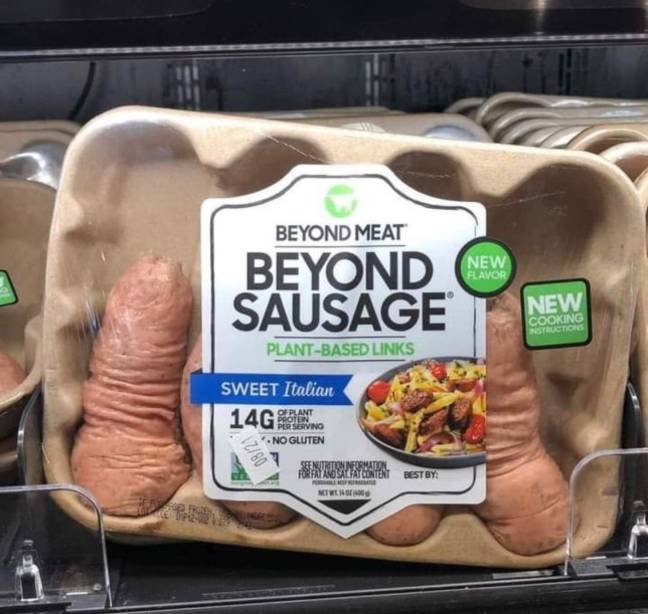Yet more evidence that plant-based meats are not the wonderful healthy alternatives they’re supposed to be, this time courtesy of a MailOnline investigation.
We love this picture: it really says everything we want to say about plant-based ‘meats’
They’re marketed as healthy alternatives to traditional meat products like sausages, burgers and kebabs.
But it turns out plant-based meat products may actually contain up to TEN times more sugar and SIX times more salt than their traditional counterparts, a new MailOnline investigation shows.
(Ed: You don’t have to write like the Daily Mail to report on the Daily Mail…)
The Daily Mail’s nutritional analysts considered a wide variety of vegetarian and vegan meat alternatives on general sale in the UK, and compared them to their traditional meat counterparts.
Graphic courtesy of MailOnline
The analysts first considered levels of sugar. Per 100g of Wicked Kitchen’s vegetarian chilli and lime kebabs, for instance, there was 2g of sugar, compared to just 0.2g for 100g of supermarket lamb kebabs.
Two Birds Eye meat-free sausages contained 2.2g of sugar, whereas there was just 0.5g in two Tesco pork sausages.
The vegetarian alternatives by Linda McCartney, Heck and Morrisons all contained up to four times as much sugar as normal meat burgers.
Meanwhile, a plant-based steak by Vivera had 2.4g of sugar per 200g, four times more than a ribeye steak.
Similarly elevated levels of sugar were found for vegetarian ‘bacon’ and ‘meatballs’.
Meanwhile, the amount of salt in some vegetarian foods was up to six times higher in some veggie options.
Vivera’s plant steak, for instance, had 2.4g of salt per 200g, while a ribeye steak of the same size sold at contained just 0.4g.
Lizzo showcases her WOMANLY CURVES in tiny orange bikini (Ed: Erm, what the hell is this doing here?)
Professor Gunter Kuhnle, a nutrition expert from the University of Reading, explained to MailOnline that the difficulty of mimicking the taste of meat is ‘one reason for introducing more salt or sugar’.
Taste has been a serious problem for manufacturers of plant-based meat alternatives, who have learned the hard way – witness their falling stocks – that consumers just don’t buy the claim that their products taste better. A recent study, which we covered recently, shows that taste and health-benefit claims are far less effective than social pressure in getting consumers to choose plant-based alternatives.
The MailOnline investigation is yet further evidence to substantiate the claim that plant-based ‘meats’ are ‘just another variety of unhealthy processed food’, as a leading food scientist and developer of plant-based meats ended up admitting recently.
We’ve described processed food as a ‘food that will make you ugly’, and for good reason. Processed foods are stuffed fool of sugar, salt and, worst of all, vegetable oils, which are now being revealed to be responsible for almost all of the negative health conditions once blamed on saturated fats and cholesterol.
Processed foods are now coming under increasing scrutiny.
In a recent documentary for the BBC, Dr Chris van Tulleken changed his diet to 80% ultra-processed foods for a month in a brave self-experiment to show the effects of consuming a diet that is followed by as much as one fifth of the British population.
As well as experiencing serious weight gain, cognitive problems, anxiety, heartburn, constipation, piles and loss of libido, most shockingly of all brain scans revealed that his brain had become rewired, just like a drug addict’s. In just one month. Further scans six weeks later revealed that the changes to his brain structure had not been reversed.
A graphic revealing the extent of the changes to Dr Chris van Tulleken’s brain when he changed to an 80% processed food diet for just one month
There is particular concern about the consumption of ultra-processed foods by children and adolescents – hence the title of the documentary, ‘What Are We Feeding Our Kids?’ – since they are now estimated to consume two-thirds of their calories in such form. As a result, one fifth of children now leave primary school (aged 11) with an obese body mass index.
As well as the serious personal cost, supporting an increasingly overweight and unhealthy population also comes at a great economic cost. By 2030, if obesity trends in the US continue, the related medical costs could rise to $66 billion a year.
The concern, then, with these plant-based alternatives is that people may choose them for themselves or, worse, their children, thinking that they are making a change for the better, when in fact they may be making no change if they are already eating processed foods, or even a change for the worse.











